Demolition Contractors Yorktown
Top Demolition Services in Yorktown
Get multiple Demo Contractor quotes for your project today! Compare profiles, reviews, accreditations, portfolio, etc... and choose the best offer.
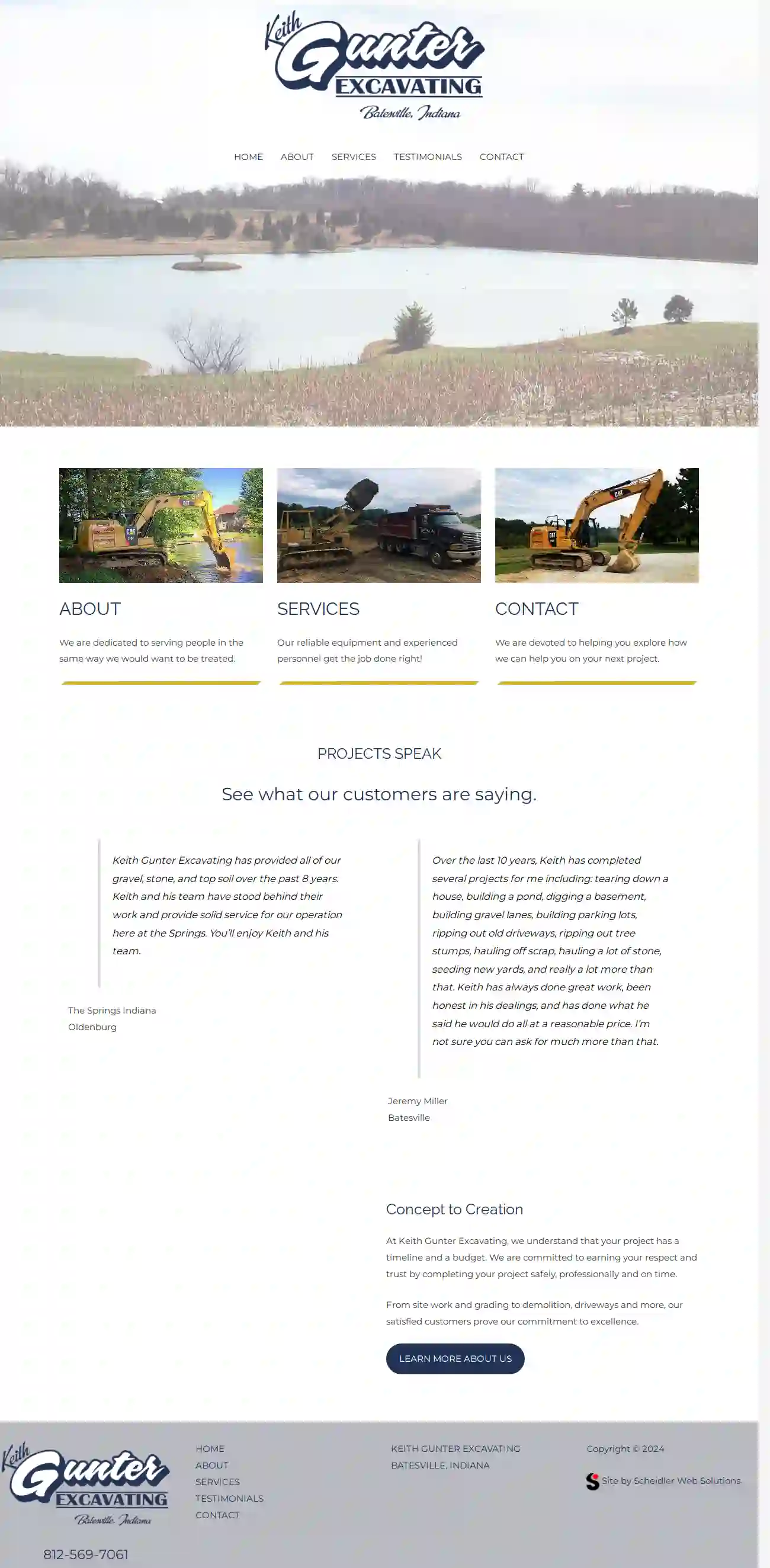
Keith Gunter Excavating LLC
515 reviewsBatesville, USWho We Are. Welcome to Keith Gunter Excavating! Keith Gunter Excavating is a third-generation, family-owned business based in Batesville, Indiana. With nearly 60 years of combined excavating experience, Keith and his team handle the ‘dirty’ work, Abby ‘digs’ handling the books, and the two youngest Gunter girls are ‘entrenched’ with looking cute and having fun. Keith Gunter Excavating offers a full-range of residential and commercial services across Southeastern Indiana. We are qualified to handle a variety of projects and will work hard to ensure you are completely satisfied!
- Services
- Why Us?
- Testimonials
- Gallery
Get Quote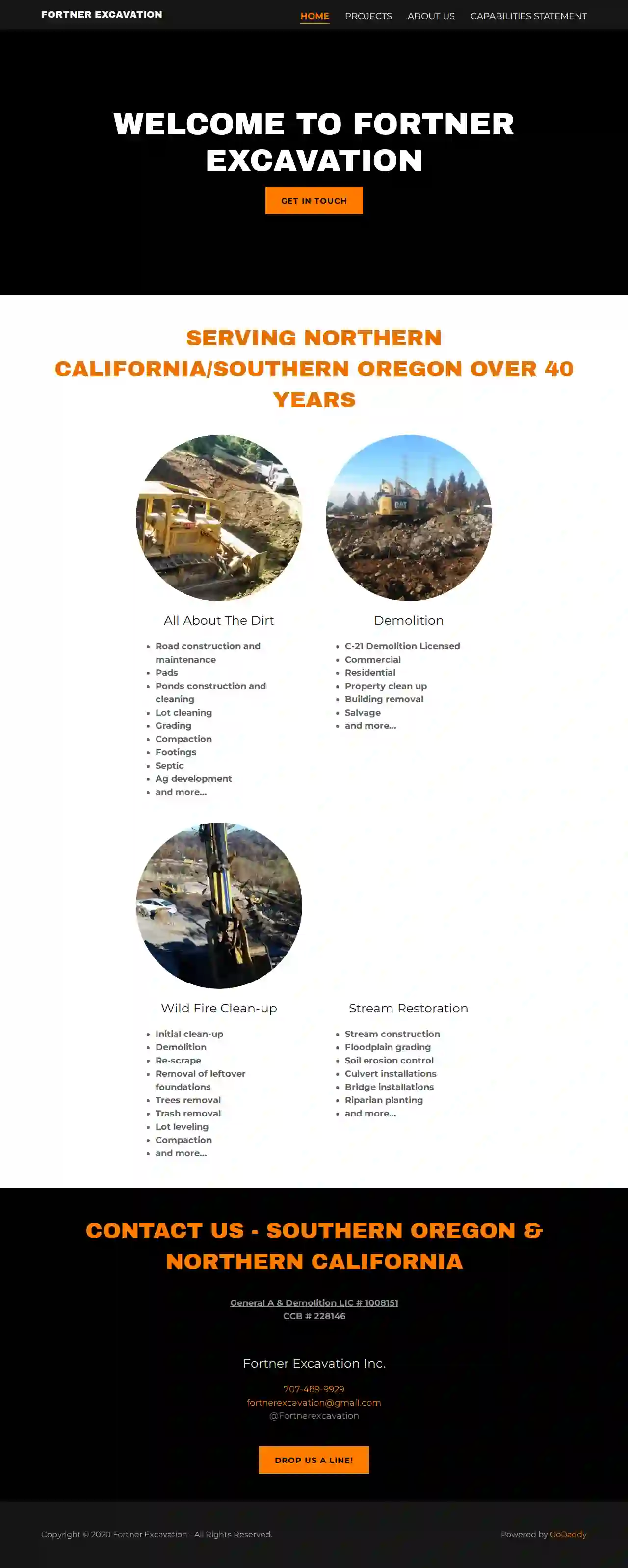
Fortner Excavation, Inc.
Chico, USAbout Us Bobby and Delaine Fortner started with 1 Backhoe and a beat up old Dump truck in December of 1979. They had a $300 payment on that backhoe and sweated every month to pay that payment. They loved it though. They wanted to be independent, self employed business owners. Since that time they have grown a little each year. Now in 2020, along with their 2 sons, they are continually making this business grow and evolve. Travis and Jeff are owners and Shareholders. We Are Expanding We are now located in the Medford and Southern Oregon area. Jeff Fortner is our “Go To Guy” for all the Jobs in that area. He is constantly working towards keeping the company running smoothly. Travis Fortner has a Tree Hedging company in addition to excavation at the Chico location and is still involved and bringing us lots of work and helping out on the side lines. Family Owned, Locally Grown We are 2nd and 3rd generation to Northern California. And we have expanded to Southern Oregon. We live and work here so we care about our customers and our quality of workmanship on every job. We are licensed to do excavation and demolition.
- Services
- Why Us?
- Our Team
- Gallery
Get Quote
K & K Excavating Inc
515 reviewsIndianapolis, USABOUT K&K EXCAVATING K&K Excavating is a family-owned and operated business that has been serving Southern Indiana and the Tri-State area since 1978. We have a long history of success and a reputation for providing exceptional quality and dependable service to our customers. We offer a wide range of services, including site prep, utility installation, soil stabilization, lake excavation, and truck hauling. If it involves dirt, we can do it! We are committed to providing our customers with the best possible service. We are highly skilled and reliable, and we always go the extra mile to ensure our customers are satisfied. We are proud of our family business and look forward to continuing to serve our community for many years to come. OUR SERVICES K&K Excavating offers a wide range of services to meet your needs. We are committed to providing our customers with the best possible service and results. We are highly skilled and reliable, and we always go the extra mile to ensure our customers are satisfied. We offer the following services: Excavating Trucking Pond Renovation Stabilization Mass Earthwork & Grading GPS Layout & Machine Control Deep Excavation Erosion Control Soil Stabilization Demolition We are always happy to discuss your specific needs and provide you with a free estimate. Contact us today to learn more about how we can help you! WHAT OUR CLIENTS SAY "Nice people and hard workers. Would highly recommend them." - Aaron B. "Great honest company that does great work!" - David L. "If you need dirt work, or utility installation, this is the place." - Tony F.
- Services
- Why Us?
- Accreditations
- Our Team
- Testimonials
- Gallery
Get Quote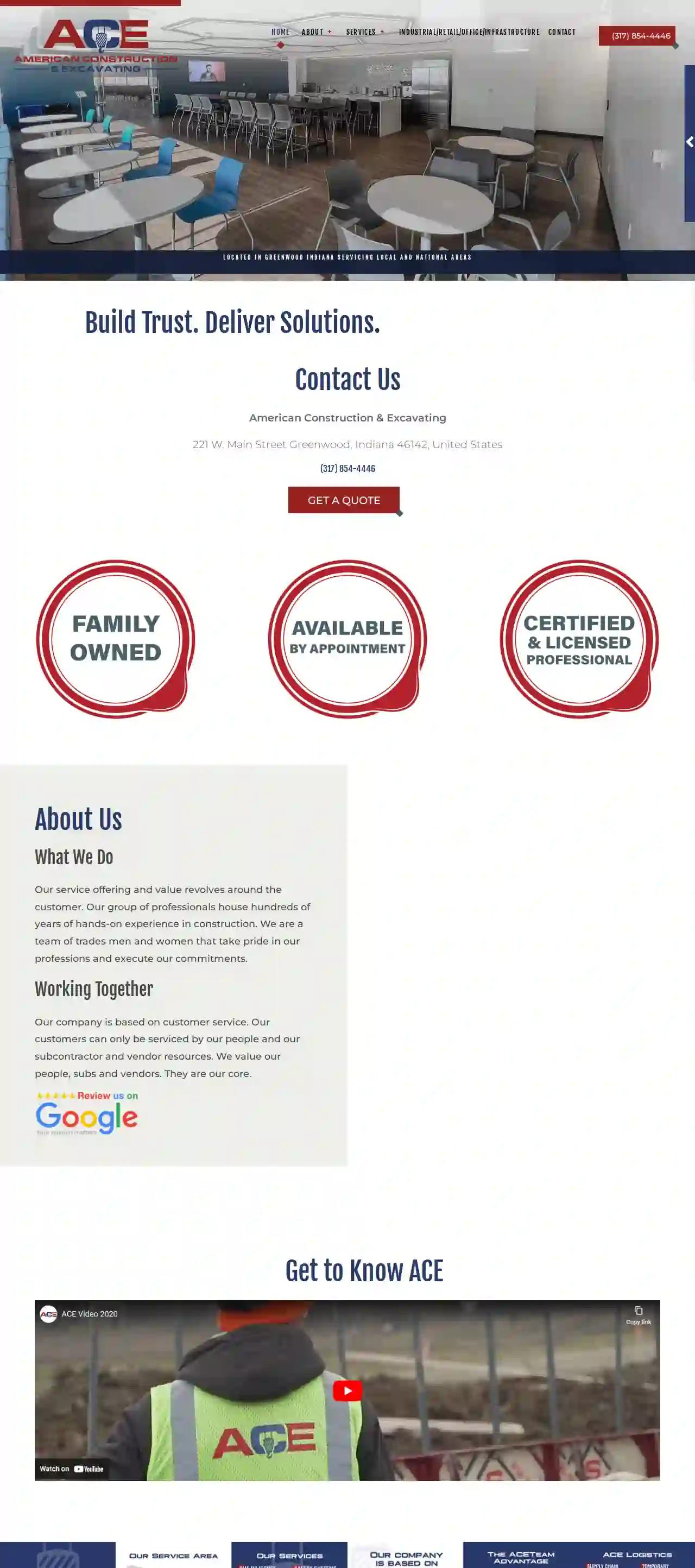
American Construction & Excavating LLC
221 W. Main Street, Greenwood, Indiana 46142, United States, 221 W. Main Street Greenwood, 46142, USAbout Us Our service offering and value revolves around the customer. Our group of professionals house hundreds of years of hands-on experience in construction. We are a team of trades men and women that take pride in our professions and execute our commitments. Working Together Our company is based on customer service. Our customers can only be serviced by our people and our subcontractor and vendor resources. We value our people, subs and vendors. They are our core.
- Services
- Why Us?
- Testimonials
- Gallery
Get Quote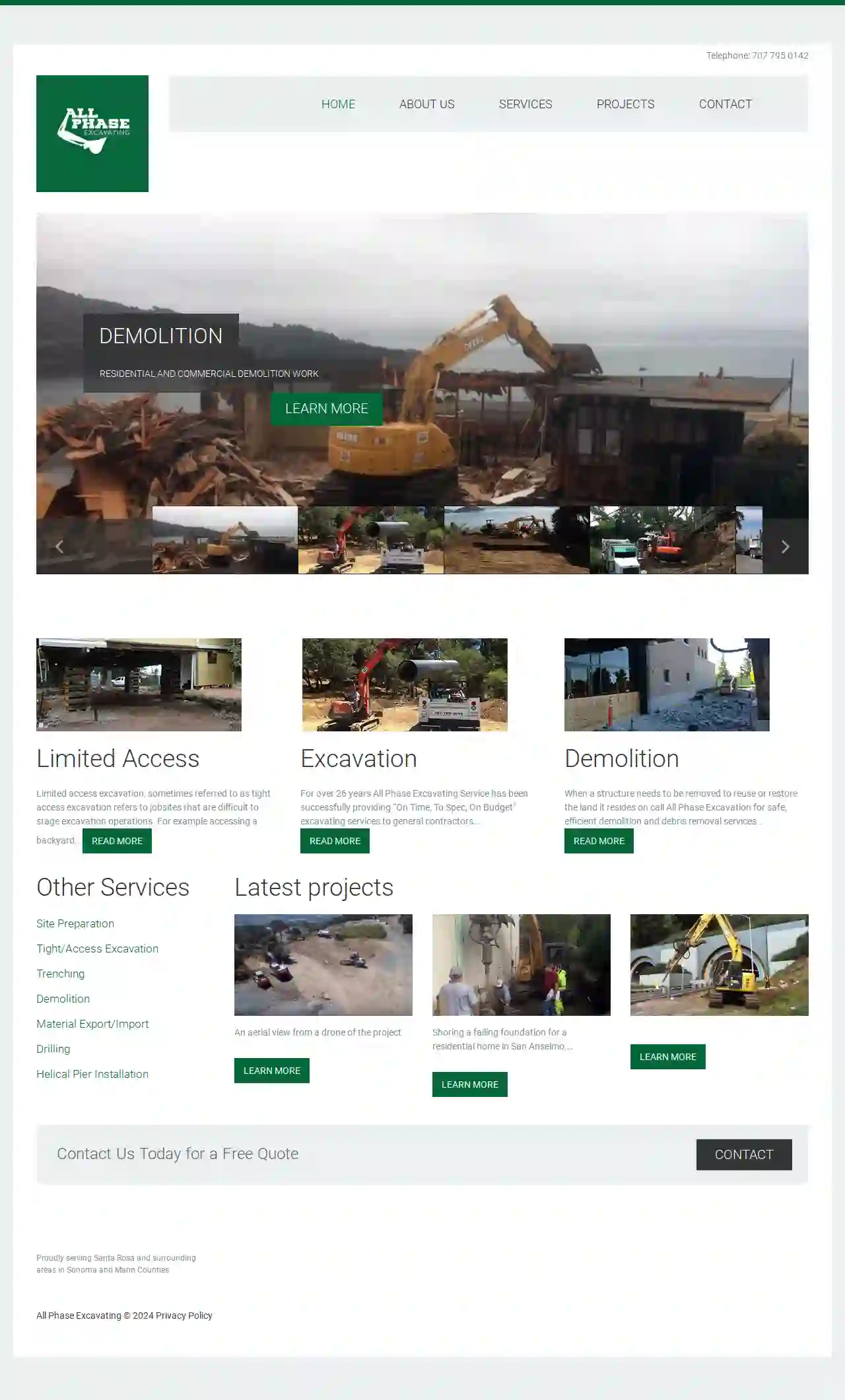
All Phase Excavating Inc
32 reviewsGary, USAbout All Phase Excavating "On time and on budget" is the goal of every excavation service company and at All Phase Excavation Service we add "done to perfection" to that tag line. When the carpenters show up to build the forms they'll find a site that is excavated to specifications, minimizing unnecessary work. We understand that a general contractor's primary concerns when selecting an excavation service include experience, capabilities, capacity, reliability, flexibility and of course a fair price. Excavation is typically the first task in starting a project and if that task is not performed to spec or is delayed it can have a serious impact on the success of the overall project. We understand the importance of being reliable and are prepared to perform the job as expected. The company started when founder and owner Vince Cheney launched All Phase Excavating in May of 1998 with a single bobcat and a pickup truck. He figured the way to be successful as a business owner is to do what you do best. "I really do enjoy excavating. I get a kick out of it and I decided that as I grew I would surround myself with other people who liked working excavation as much as I do." Serving Marin, Napa and Sonoma counties All Phase Excavating is headquartered in Penngrove with an equipment yard centrally located in Sonoma County. All Phase Excavating has grown from a single bobcat and a truck to 22 pieces of excavating and hauling equipment specifically acquired to tackle client needs. All Phase Excavating has the capability to tackle any excavating project large or small, from ground clearing to hauling debris. If It's an Excavating Challenge We Want a Shot at It As a general contractor you may not be overly concerned if your excavator is has a passion for moving earth but if you think about it, people who really enjoy their work are typically better at it than most. They see difficult jobs as a test of their skill and that's why we excel at tight access, hillside excavation, full and partial structure demolition and abatement and other demanding excavating projects. Vince is personally involved onsite in every project often working side by side with his crews. This onsite management involvement assures quality work and allows for streamlined communications with the general contractor. All Phase is a Responsible Community Business Is there a Californian that is not aware of the state's efforts to protect and improve our environment? At All Phase Excavation we are in full compliance with requirements with DPF requirements and our abatement service
- Services
- Why Us?
- Gallery
Get Quote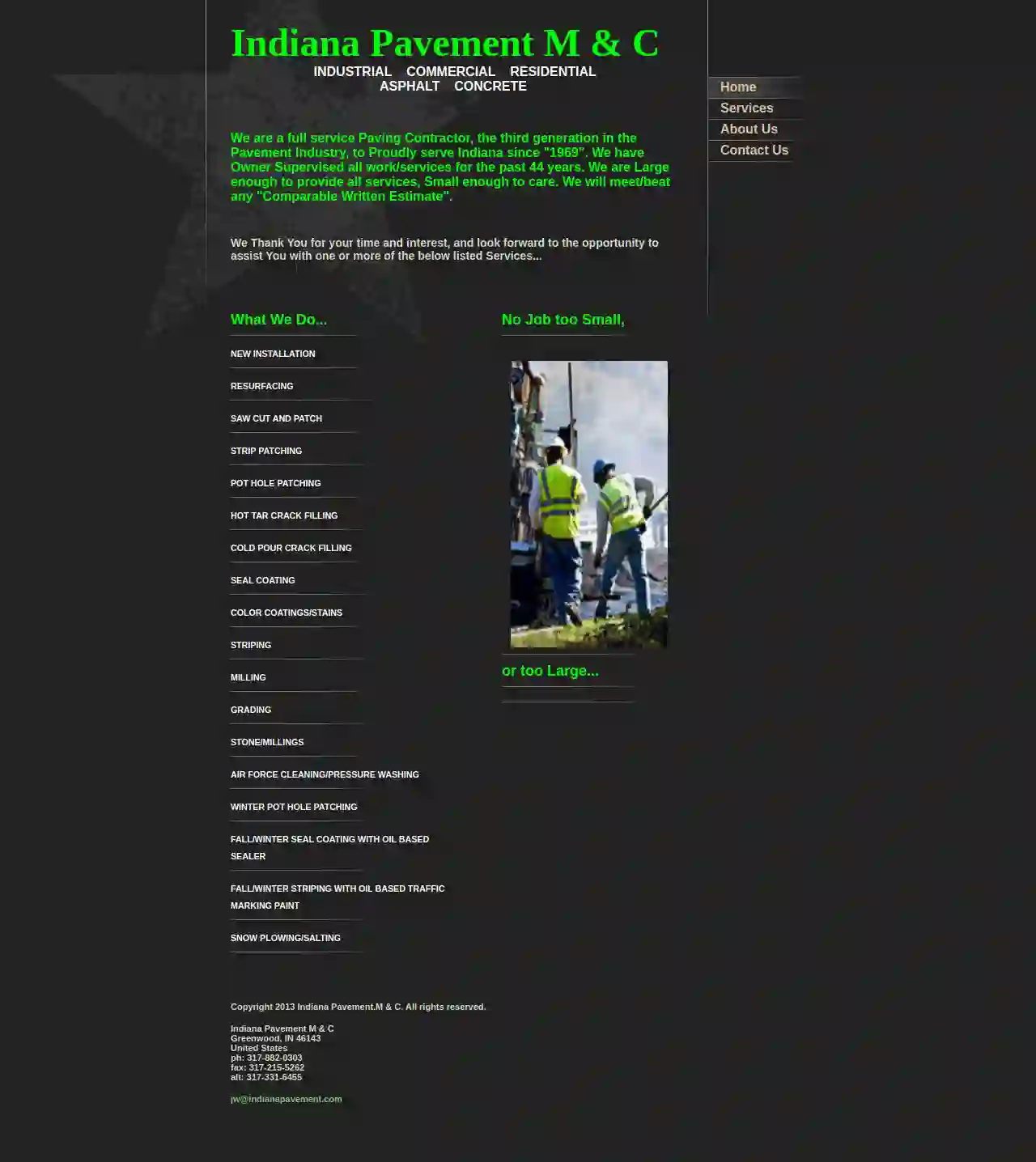
Indiana pavement M & C
4.325 reviewsGreenwood, 46143, USIndiana Pavement M & C: Your Trusted Paving Partner Indiana Pavement M & C is a family-owned and operated paving contractor with a rich history spanning three generations. Since 1969, we've been serving Indiana with pride, providing top-notch paving solutions for residential, commercial, and industrial clients. Our commitment to quality and customer satisfaction has earned us a reputation as a reliable and trustworthy partner in the pavement industry. We take pride in our owner-supervised approach, ensuring every project is completed to the highest standards. Our team is large enough to handle any project, yet small enough to provide personalized attention and care. We believe in transparency and offer competitive pricing, always striving to meet or beat any comparable written estimate. We are dedicated to providing a wide range of services to meet your specific needs. From new installations to repairs and maintenance, we have the expertise and experience to handle it all. We are committed to delivering exceptional results that enhance the beauty and functionality of your property. We understand the importance of protecting your investment. Our services, such as crack filling and seal coating, are designed to preserve your pavement and prevent costly repairs down the line. We are confident that our work will exceed your expectations and leave you with a lasting impression. Contact us today for a free consultation and estimate. We look forward to partnering with you on your next paving project.
- Services
- Why Us?
- Gallery
Get Quote
Valpo Excavation & Septic
1101 Cumberland Crossing Drive, Suite 223, 1101 Cumberland Crossing Drive Suite 223, Valparaiso, 46383, USValpo Excavation & Septic: Your Trusted Excavation Partner in Northwest Indiana At Valpo Excavation, we are dedicated to delivering exceptional service with every project. Our team boasts years of experience in professional excavation, grading, trenching, site preparation, septic installation & repairs, and a wide range of other services. We are equipped with the most reliable equipment and skilled professionals to handle any excavation, septic, and foundation needs. When you require groundwork in Northwest Indiana, we are your one-stop solution. We understand that site preparation is crucial for any construction project. We offer a comprehensive suite of services, from grading and trenching to foundation installation. Our team at Valpo Excavation & Septic has extensive experience in heavy construction and will execute your sitework with precision and efficiency. Valpo Excavation is a locally-owned and operated company founded by Russ Buechs, a man driven by the American Dream. Russ is a family-oriented businessman committed to providing a fulfilling life for his family. This dedication led him to establish this family-owned, faith-based company from the ground up. He built this company with honesty, trustworthiness, and integrity as core values. His mission is to provide solid foundations for every home and business throughout Northwest Indiana. From initial site preparation to the laying of foundations and utilities, Valpo Excavation can handle it all with expertise and reliability. For over 15 years, Russ has been a dedicated professional in heavy construction. He possesses experience in every stage of home building, from foundation work to gutter installation. Additionally, his multi-year mission work in Guatemala provided him with valuable experience in concrete pouring. Russ's diverse experience makes him highly knowledgeable and prepared to deliver exceptional results. At Valpo Excavation, we provide excavation services, sitework, clear cutting, trenching, land grading, flatwork, and foundation work for any home or business in Northwest Indiana. We collaborate with both contractors and individual homeowners or business owners. Whatever your excavation needs may be, we have the solution.
- Services
- Why Us?
- Gallery
Get Quote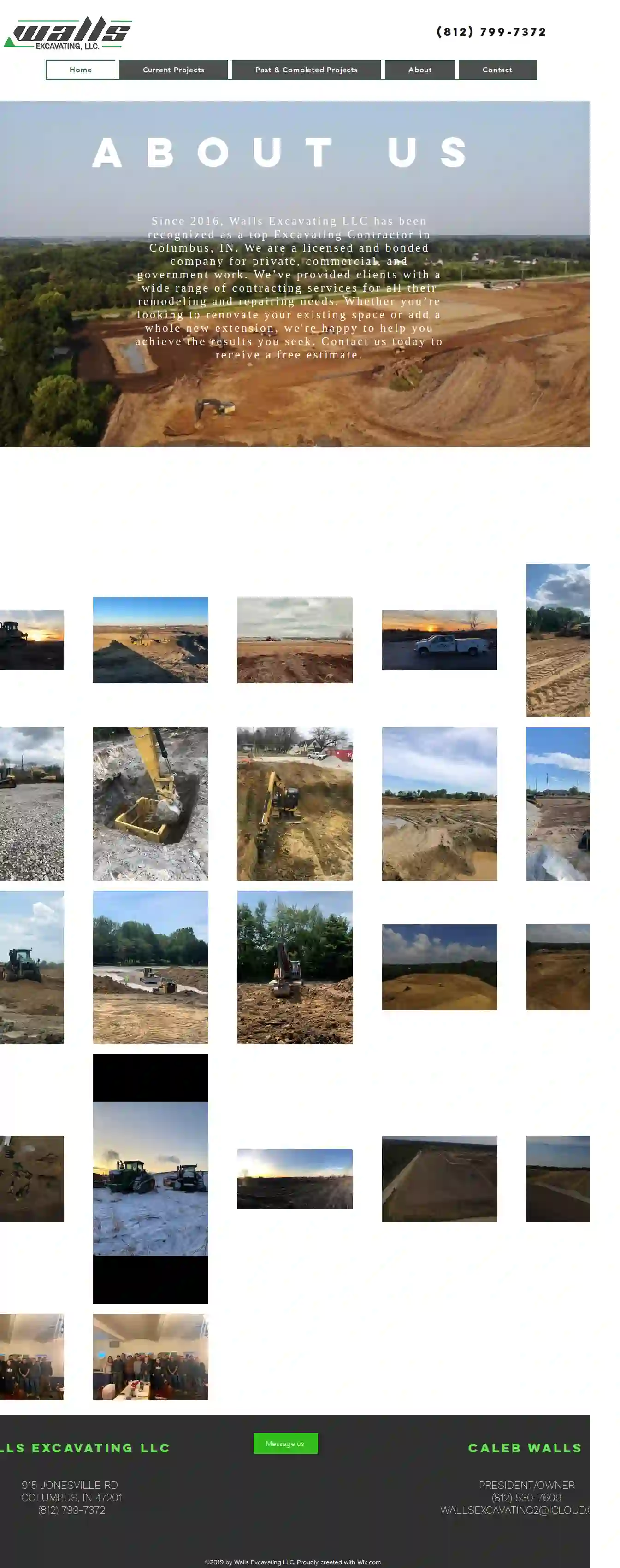
Walls Excavating LLC
3.73 reviews915 JONESVILLE RD, Columbus, 47201, USAbout Walls Excavating LLC Since 2016, Walls Excavating LLC has been recognized as a top Excavating Contractor in Columbus, IN. We are a licensed and bonded company for private, commercial, and government work. We’ve provided clients with a wide range of contracting services for all their remodeling and repairing needs. Whether you’re looking to renovate your existing space or add a whole new extension, we're happy to help you achieve the results you seek. Contact us today to receive a free estimate.
- Services
- Why Us?
- Our Team
- Gallery
Get Quote
Ghilotti Construction Company
4.85 reviews246 Ghilotti Avenue, Santa Rosa, 95407, USGhilotti Construction: A Legacy of Excellence For over 108 years, Ghilotti Construction has been a trusted name in the Bay Area, renowned for its commitment to hard work, dependability, and community involvement. As a 100% employee-owned company, we take pride in our family tradition of excellence, delivering exceptional general engineering services to a wide range of clients. Our team of experienced professionals is dedicated to providing comprehensive solutions for all your construction needs, from total site preparation and underground utilities to residential and commercial concrete projects. We are also equipped to handle emergency work, ensuring your project stays on track, no matter the circumstances. At Ghilotti Construction, we believe in building strong relationships with our clients, partners, and the communities we serve. We are committed to sustainable practices and strive to leave a positive impact on the environment.
- Services
- Why Us?
- Gallery
Get Quote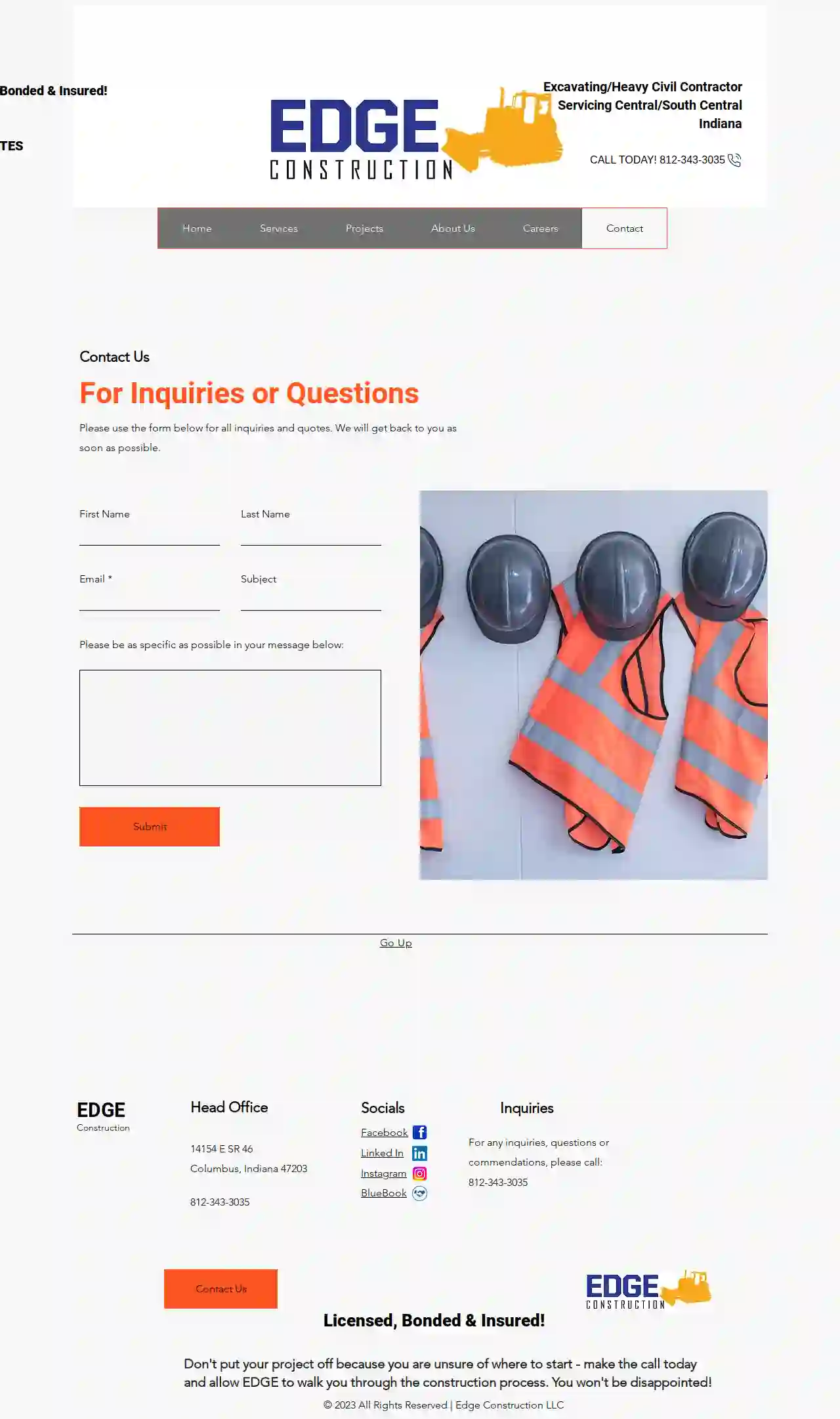
Edge Construction
14154 E SR 46, Columbus, 47203, USEDGE Construction: Your Trusted Partner for Excavating and Heavy Civil Projects in Central and South Central Indiana EDGE Construction is a licensed, bonded, and insured excavating and heavy civil contractor serving Central and South Central Indiana. We are committed to providing our clients with high-quality construction services at competitive prices. Our team of experienced professionals is dedicated to delivering projects on time and within budget. We understand that your project is important to you, and we are committed to working with you every step of the way to ensure your satisfaction. Whether you need a new driveway, a foundation for your dream home, or a large-scale commercial project, EDGE Construction has the expertise and resources to get the job done right. We offer a wide range of services, including: - Excavating - Grading - Site preparation - Utility installation - Concrete work - And more! We are proud to serve the communities of Central and South Central Indiana. We are committed to providing our clients with the highest level of service and quality. Contact us today for a free quote!
- Services
- Why Us?
- Gallery
Get Quote
Over 22,076+ Excavation Companies registered
Our excavation contractors operate in Yorktown and beyond!
ExcavationHQ has curated and vetted the Best Excavation Contractors in and around Yorktown. Find a top & reliable contractor today.
Frequently Asked Questions About Demolition Contractors
- Recycling: Concrete, brick, metal, and wood can be recycled and reused in other construction projects, reducing waste sent to landfills.
- Landfill Disposal: Non-recyclable materials are disposed of in designated landfills according to local regulations.
- Donation: Some materials, such as fixtures or appliances, may be suitable for donation to charitable organizations.
- Site Security: Secure the demolition site with fencing and warning signs to prevent unauthorized access.
- Personal Protective Equipment (PPE): Workers should wear appropriate PPE, including hard hats, safety glasses, gloves, and steel-toe boots.
- Hazardous Material Removal: Properly identify and remove asbestos, lead paint, or other hazardous materials before demolition begins.
- Utility Disconnections: Disconnect all utilities, such as electricity, gas, and water, before demolition.
- Controlled Demolition Techniques: Employ controlled demolition methods to minimize risks and ensure the structure comes down safely.
- Dust Control: Implement dust suppression measures, such as water spraying or misting, to reduce airborne particles and protect air quality.
- Emergency Planning: Have an emergency plan in place, including communication protocols and evacuation procedures, in case of unforeseen events.
- Feasibility Studies: Assessing the viability and challenges of a demolition project.
- Demolition Planning: Developing demolition plans, including method selection, sequencing, and safety procedures.
- Permitting Assistance: Navigating the demolition permitting process and ensuring compliance with regulations.
- Hazardous Material Surveys: Identifying and managing hazardous materials, such as asbestos and lead paint.
- Cost Estimating: Providing accurate cost estimates for demolition services.
- Project Management: Overseeing the demolition process and ensuring it proceeds as planned.
What happens to the debris after demolition?
What are the safety precautions for demolition?
What is the role of a demolition consultant?
Can I do demolition myself?
What happens to the debris after demolition?
- Recycling: Concrete, brick, metal, and wood can be recycled and reused in other construction projects, reducing waste sent to landfills.
- Landfill Disposal: Non-recyclable materials are disposed of in designated landfills according to local regulations.
- Donation: Some materials, such as fixtures or appliances, may be suitable for donation to charitable organizations.
What are the safety precautions for demolition?
- Site Security: Secure the demolition site with fencing and warning signs to prevent unauthorized access.
- Personal Protective Equipment (PPE): Workers should wear appropriate PPE, including hard hats, safety glasses, gloves, and steel-toe boots.
- Hazardous Material Removal: Properly identify and remove asbestos, lead paint, or other hazardous materials before demolition begins.
- Utility Disconnections: Disconnect all utilities, such as electricity, gas, and water, before demolition.
- Controlled Demolition Techniques: Employ controlled demolition methods to minimize risks and ensure the structure comes down safely.
- Dust Control: Implement dust suppression measures, such as water spraying or misting, to reduce airborne particles and protect air quality.
- Emergency Planning: Have an emergency plan in place, including communication protocols and evacuation procedures, in case of unforeseen events.
What is the role of a demolition consultant?
- Feasibility Studies: Assessing the viability and challenges of a demolition project.
- Demolition Planning: Developing demolition plans, including method selection, sequencing, and safety procedures.
- Permitting Assistance: Navigating the demolition permitting process and ensuring compliance with regulations.
- Hazardous Material Surveys: Identifying and managing hazardous materials, such as asbestos and lead paint.
- Cost Estimating: Providing accurate cost estimates for demolition services.
- Project Management: Overseeing the demolition process and ensuring it proceeds as planned.